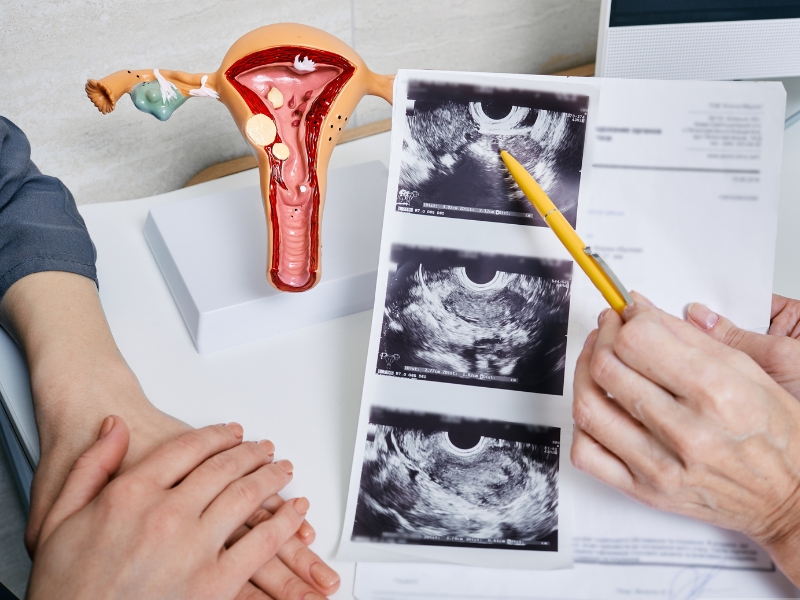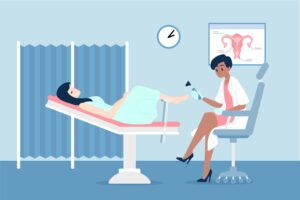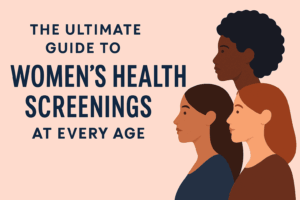Taking care of your health is one of the best gifts you can give yourself. For women, this can be regular gynaecological check-ups. Many women tend to overlook these check-ups until they face serious health issues. But routine visits to a gynecologist can help prevent issues, detect early signs of disease as well as support your overall well-being. So, book your checkup appointment with the best reproductive endocrinologists at ‘Advamed Hospital & Adbaby IVF Centre’.
In this blog post, we’ll explain why gynecological check-ups are so important, what to expect during a visit, and how they benefit women at every stage of life. So, stay on it!
Gynaecological Check-up: What Is It?

A gynecological check-up is a medical examination done by a gynaecologist — a doctor who specialises in women’s reproductive health. These check-ups are not only for women with problems. They are a part of regular healthcare that every woman should follow.
- During the visit, the doctor may:
- Ask about your medical and menstrual history
- Perform a pelvic exam
- Do a Pap smear test (to detect cervical cancer)
- Check for breast lumps or abnormalities
- Confers advice on birth control or pregnancy
These visits help you stay informed and safe when it comes to your body.
Why Women Need Gynecological Exams?

The routine gyno exam for females can help to deal with the following problems:
Early Detection of Diseases
Regular check-ups can detect:
- Cervical cancer
- Breast cancer
- Ovarian cysts
- STIs (Sexually transmitted infections)
- Fibroids and other growths
Early detection means early treatment, which can save lives.
Monitoring Reproductive Health
Women’s reproductive systems go through many changes:
- Puberty
- Menstrual cycles
- Pregnancy
- Menopause
Regular gynecological visits help monitor these changes plus manage any problems that may arise. For example, irregular periods, severe cramps, or abnormal bleeding should not be ignored.
Reproductive Health Planning
If you are planning for a baby, a gynecological check-up is the first step. The doctor can:
- Check your overall health
- Suggest prenatal vitamins
- Offer advice on ovulation and fertility
This makes sure of a safe and healthy pregnancy journey.
Preventive Care and Vaccinations
Your gynaecologist may recommend:
- HPV vaccine (to prevent cervical cancer)
- Routine Pap smears
- Breast exams
- Contraception options
Preventive gynecological care can help you avoid problems before they start.
Guidance Through Menopause
As women age, they face menopause symptoms like:
- Hot flashes
- Mood swings
- Vaginal dryness
Your doctor can confer treatment along with lifestyle tips to manage these symptoms comfortably.
At What Age Should Women Start Seeing a Gynaecologist?
A common question many women have is when they should start seeing a gynecologist. Generally, girls can begin consulting a gynecologist between the ages of 13 and 15, especially if they experience:
Menstrual issues
Heavy bleeding or pain
Questions or concerns about puberty
Most women should begin regular gynecological check-ups by the age of 21. After that, an annual visit is recommended, unless your doctor advises a different schedule based on your individual health needs.
Some Common Concerns Women Have Before a Check-up
Feeling a little anxious about visiting a gynaecologist is totally okay. Here are some common concerns:
Embarrassment or Shyness
Several women feel shy about pelvic exams. But do not forget, doctors are professionals. They are trained to make you feel safe and comfortable.
Fear of Pain
Most exams are quick and cause only mild discomfort. Communicate with your doctor during the exam.
Worry About the Results
It’s normal to worry about test results. But finding out about a problem early gives you the best chance of treating it successfully.
What to Expect During a Gynaecological Visit?

Knowing what to expect during a check-up can aid you feel less worried.
Health History Discussion
Your doctor will ask about:
- Menstrual cycle
- Past pregnancies
- Sexual activity
- Any discomfort or unusual symptoms
Physical and Pelvic Exam
This may include:
- External and internal exam of the vaginal area
- Checking the uterus and ovaries
- Breast examination
Tests and Screenings
- Pap smear: A sample of cells from the cervix is taken to check for cancer
- STD tests: If needed, especially if you’re sexually active
Advice and Counselling
The doctor may discuss:
- Family planning
- Healthy lifestyle choices
- Fertility issues
- Menopause support
How Often Should You Go for a Check-up?
The frequency depends on your age & health status.
Age Group | Recommended Frequency |
13–20 years | As needed for menstrual or puberty issues |
21–29 years | Every 1-2 years (with Pap smear) |
30–65 years | Every year, or as advised |
Above 65 years | Based on health and records |
If you have specific health concerns, your doctor may suggest more frequent visits.
Look at the Regular Gynaecologist Visit Benefits
- Peace of Mind: Knowing that you’re healthy reduces stress and gives confidence.
- Better Health Outcomes: Regular monitoring means any problems are caught early.
- Trusted Medical Guidance: A gynaecologist can be your partner in making health decisions.
Don’t Ignore These Symptoms – Visit a Gynecologist
You should schedule a gynaecological check-up if you notice:
- Unusual vaginal discharge
- Pain during periods or sex
- Irregular menstrual cycles
- Itching, swelling, or sores in the genital area
- Breast lumps or nipple discharge
These signs could be harmless, but they might also indicate something serious.
Supporting Women’s Health Through Education
Many women skip gynaecological visits due to a lack of awareness. It’s time we changed that. Spreading knowledge about the importance of women’s health checkups is significant in every community.
Inspire your friends, sisters, mothers, as well as daughters to prioritise their reproductive health. Your health is your power. No matter your age, regular gynaecological check-ups help you stay strong, healthy, and in control of your body. Don’t wait for a problem to appear — prevention is always better than a cure.
Overall, women must understand the importance of gynaecologist visits. They should make it a habit to visit a gynecologist once a year or as advised. These visits are not just about treating problems. They are about empowering you to live a healthy as well as a happy life.
If you still have any questions in your mind, feel free to ask the best gynecologists at ‘Advamed Hospital & Adbaby IVF Centre’. We are always present in your welfare!
Common Questions About Gynecological Check-ups
Why are regular gynecological check-ups important?
Regular gynecological check-ups are crucial for maintaining your overall reproductive health. They help in early detection of issues such as cervical cancer, STIs, and fibroids, and they also provide essential preventive care. These check-ups allow your gynecologist to monitor your reproductive health over time and offer guidance on contraception, fertility, and menopause.
How often should you do a gynecological exam?
The frequency of gynecological exams depends on your age and health needs:
- 13–20 years: As needed for menstrual or puberty issues
- 21–29 years: Every 1-2 years (with a Pap smear)
- 30–65 years: Annually or as advised by your doctor
- Above 65 years: Based on your medical history and records
If you have specific health concerns or risk factors, your doctor may recommend more frequent visits.
What tests are done during a gynecological exam?
During a gynecological exam, your doctor may perform several tests to check for common reproductive health issues. These typically include:
- Pap smear: To screen for cervical cancer
- Pelvic exam: To check for abnormalities in the reproductive organs
- Breast exam: To check for any lumps or changes in breast tissue
- STD tests: If you’re sexually active or showing symptoms of an infection
- Urine tests: To check for signs of infection or other health issues
What is included in a gynecological examination?
A typical gynecological exam may include:
- Health history review: Your doctor will ask about your menstrual cycle, sexual activity, past pregnancies, and any health concerns.
- Pelvic exam: A physical exam of your reproductive organs (vagina, cervix, uterus, and ovaries).
- Breast examination: To check for lumps or other irregularities.
- Pap smear: A test to screen for cervical cancer.
- Tests for STIs: If necessary, your doctor may test for sexually transmitted infections.
Discussion and advice: Your gynecologist may discuss contraceptive options, lifestyle choices, fertility concerns, and menopausal symptoms.












